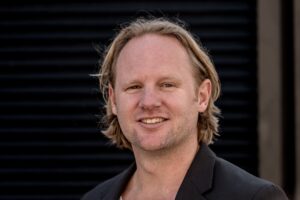By 2025, all auditors for the Safety Culture Ladder must be re-attended. This means nothing more or less than that during an audit, an expert looks along with the auditor to see if he is doing his job properly. In this way, NEN is trying to increase the quality of audits and thus take customer safety to a higher level, explains Wouter Koppelaar.
Wouter Koppelaar's career mainly takes place in the field of health and safety. 'I have put this subject on the map at several companies and that is also how I came into contact with the Safety Culture Ladder, especially the hearts and minds part important in that. Eventually, I entered the trainers' profession at WerkendeMensen BV and give courses at NEN, among others on conversation skills. This of course has a clear link with SCL, which also deals with soft skills. The idea arose fairly quickly to do something with that towards our auditors for the SCL and so we set up an assessment methodology for NEN to give residents a tool to assess auditors as well and objectively as possible.'
Methodology
'Attendance, what are they? 'Attendance refers to attending the audit team. By attending, NEN wants to get a picture of the competences of the audit teams deployed and the competences of the individual auditor. This concerns, for example, whether the auditor knows how to seek depth in his interviews in order to clarify a client's behaviour and safety culture. So, together with a team of residents, I set up an assessment system so that all residents can assess auditors in a uniform way. All the experiences of the involved adjuncts are also incorporated in the system and we still consult periodically to review the approach.'
Process
With the advent of the new SCL, the 2.0 version, it is mandatory for auditors to be re-attended before 2025. During an attendee, an attendee joins an audit team for a day and sits like a fly on the wall during the audit, Koppelaar explains. 'The tutor does not interfere with the content of the interview, but purely watches how the auditor does his work. At the end of the day, the tutor gives his feedback to the auditor, indicating how he scored on soft skills in particular. This includes questions like "did you ask questions well?", "did you manage to create enough depth?", "did you use enough open questions to get to the heart of the matter?" and things like that. If there is reason to say that it is not yet sufficient, there should be another attendance within six months. If that sufficient score is not achieved even then, the auditor loses the right to audit on the SCL.'

Skills
The most important thing for the bystander is to know the SCL well. 'Most admins are either involved in the standard, have a lot of knowledge about it or are even involved in drafting it. They also provide training on it to auditors. Professionally, it is a rock-solid group of people. In addition, they must have a good understanding of which soft skills are required and how to score on them. For the latter, there is now the assessment system. This makes it easier for them to determine whether someone asks sufficiently in-depth questions, for instance.'
Importance
Attendance is very important within the SCL certification process, says Koppelaar. 'It was created to get auditors to a higher level. To be honest, this was necessary because NEN sometimes received complaints from work about the level and quality of auditors. They were quite far apart, whereas the aim is of course to deliver a consistently high level. Because a resident assesses the auditor, the bar does have to be set high so that the SCL 2.0 is audited properly to get the safety level at customers even higher.'
Welcome
For some auditors, such an extra pair of eyes watching along is fine or actually not exciting because the auditor is doing a fine job. Others actually find it annoying. It is an exam you have to take. And if you have been doing your work in your own way for so many years and suddenly someone from outside thinks you are not doing it properly, it can be hard to swallow. But adjusting your way of auditing is then the right solution. You have to think of the greater good, which is increasing customer safety. That's why externals are usually welcome in audits. Moreover, the method's way of giving feedback is very structured and we give many examples of how certain things can be done better. Thus, the auditor immediately has handles that he can use to improve his work. In that sense, the assessment has become much clearer than before and is also better received. The auditor in question can also immediately start practising, for example, interview skills to improve them for the next attendance.'
Scheduling
The scheduling and eventual execution of inspections could be a bit more flexible, Koppelaar thinks. 'There is still a challenge there for certifying bodies. You have to be attended to before 2025. If not, you can no longer do audits. So some haste is called for.'